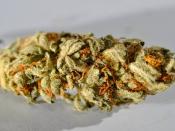Marijuana has been illegal for years because of the thought that it was a drug similar to cocaine, or heroin. Drugs such as cocaine and heroin affect the neurotransmitter dopamine. Dopamine is the neurotransmitter associated with extremely pleasurable sensations. If a drug interferes with its production and causes too much to be produced the result is extremely pleasurable and can lead to severe abuse and addiction. It has recently been proven that marijuana is not a drug that affects the production of dopamine.
The average marijuana plant contains over 400 chemicals and when the plant is smoked or vaporized the heat produces many more. Receptors in the nerve cells of the brain receive these chemicals and the chemicals cause the nerve cell to change in some way. The chemical in marijuana that has the biggest impact on the brain is THC (tetrahydrocannabinol).
THC receptors are abundant in the brain but they are concentrated in certain areas.
One region of the brain where THC receptors are highly concentrated is the hippocampus. The hippocampus is the area of the brain that processes memory. When THC attaches to receptors in the hippocampus, it weakens short-term memory. The hippocampus also communicates with other regions of the brain that process new information into long-term memory. So under the influence of marijuana, new information may never register and be lost from memory completely. There is also a dense concentration of THC receptors in the basal ganglia and the cerebellum. Both of these areas affect movement and coordination. One area that does not contain any THC receptors is the medulla. The medulla controls many functions essential to life such as heart rate and digestion so the lack of receptors in this area has prevented any deadly overdoses of marijuana.
In addition to having significant effects on the...


